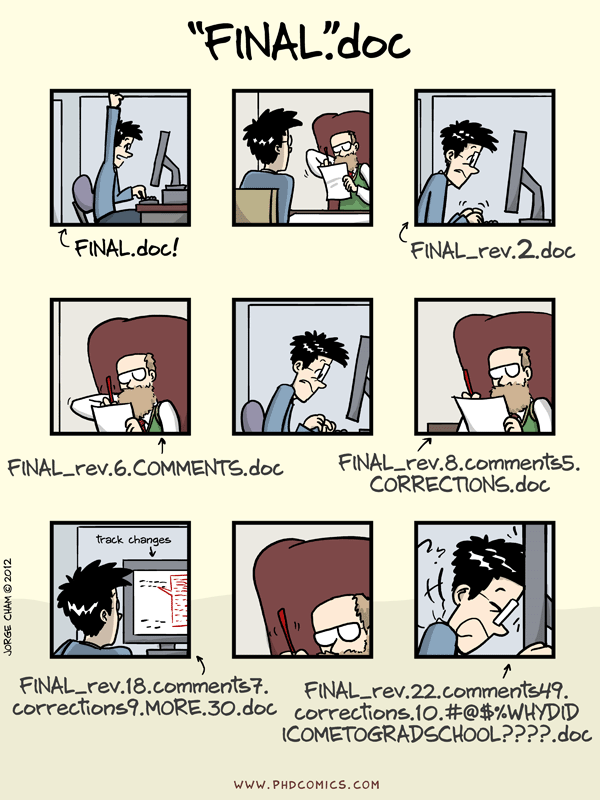Cognitive load
Inspired by an amazing talk by Julia Evans, I will record tools I use to reduce my cognitive load on this page!
Tools
Git: Version control is a necessary part of every day knowledge work, even if you don’t count software. Without tools to help us do version control, we invent our own version control systems, and that rarely works out well:

Piled Higher and Deeper by Jorge Cham https://www.phdcomics.com
- pre-commit: A tool for sharing Git hooks in a standard way. This enables linting, formatting, analysis, and more to occur automatically at commit-time instead of needing to be operated by a human. I no longer need to think “I should remember to lint before committing” (and I often forget); it just happens. Of all the tools I use, nothing has had a larger impact than pre-commit; it enhances every single other tool by enabling them to work like magic in the background.
- pre-commit.ci: A free zero-config-required CI service for open source projects. It runs your pre-existing pre-commit config so even if a contributor doesn’t install pre-commit, the checks will run on pushed commits. This service will also ensure that version numbers in your pre-commit configuration are kept up-to-date automatically; one less thing to think about!
- Pixi: A new package management tool for conda and PyPI packages. It drastically reduces the cognitive load of the typical conda workflow by managing your dependency manifest and lockfiles for you. It’s also fast – waiting minutes for an environment solve can really mess up your working memory.
Methods
Type annotations and checking: When working in a language that doesn’t support type annotations, I use additional tooling (e.g. Mypy, maybe one day Ty) or a transpiled language (e.g. TypeScript) to enable type annotation and checking. By explicitly documenting and verifying correctness of interfaces, I need to hold less information about how different parts of the codebase talk to each other.
Vertical space: Intentional vertical space can explicitly indicate boundaries between concepts. For example, when writing prose I like to write lots of small paragraphs and use lots of headers and subheaders to make information hierarchy explicit. I also love the one sentence per line technique when writing markdown – it’s clear when my sentences are too long and when I am writing redundantly.
Early returns/raises: Put exceptions first, and core business logic last. Which is easier to understand?
if not is_ready: raise NotReadyException if not is_set: raise NotSetException # Business logic: go!Or:
if is_ready and is_set: # Business logic: go! elif not is_ready: raise NotReadyException elif not is_set: raise NotSetExceptionPair programming: There’s no better way to understand where cognitive load is a problem in your codebase or writing than pair programming and listening to another human’s perspective.
Python
I write a lot of Python, and I find these tools reduce my cognitive load and in many cases, also reduce the amount of typing I have to do, which is good for my health.
- Black: Instead of worrying about formatting, which I can be very picky about, I focus on the problem I’m trying to solve and let Black format for me. In contrast with tools I used previously for this purpose (e.g. Flake8), Black doesn’t just check my formatting, it fixes it. Black is also opinionated, which reduces bikeshedding about formatting on my teams.
- Ruff: A Python linter written in Rust. Ruff has many new linting rules and has also adopted rules from pre-existing tools. Ruff can also auto-fix a significant portion of rule violations. I need to spend less thought on setting up rules and finding new linters and plugins, and I need to fix fewer problems by hand because Ruff does it for me. In combination with pre-commit and Black, I feel like I’ve reached an almost perfect state in which I’m not distracted by my tools and can focus purely on solving problems while my tools do magical things like upgrade my code to use new features in new Python releases.
- Python type annotations & checker: While Python is known to be readable, it’s possible to write hard-to-read Python. One way is by naming variables ambiguously and passing those variables through a deep stack of function calls. To debug an inner function’s behavior, I have to debug or climb my way up the stack to reason about what’s being passed in. Type annotations enable verifiable self-documentation, so I don’t have to investigate to understand what kind of data I’m working with.
JavaScript
I don’t write JavaScript that often, but when I do:
- TypeScript: I find JavaScript code requires a lot of cognitive load to read, but with the addition of typing, I find it’s both easier to read and write clean JavaScript. I will almost always write TypeScript over JavaScript.
- ESLint: I use this for the same reason I use Ruff.
Bash
I used to write a lot more Bash than I do now, so I’ve forgotten a lot of the Bash trivia I used to have memorized. Thankfully, I have tools to help me 🤓
- Shellcheck: As mentioned in Julia’s talk, Shellcheck knows most of Bash’s “gotchas” and frees you to worry about your problems instead of Bash’s problems.
Resources
- Cognitive load is what matters by Artem Zakirullin